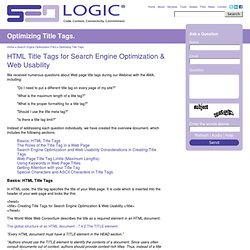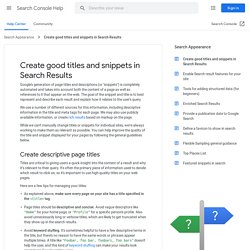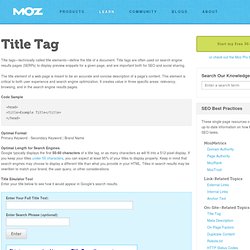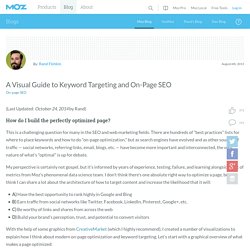

HTML Title Tags for Search Engine Optimization & Web Usability. We received numerous questions about Web page title tags during our Webinar with the AMA, including: "Do I need to put a different title tag on every page of my site?

" "What is the maximum length of a title tag? " "What is the proper formatting for a title tag? " "Should I use the title meta tag? " "Is there a title tag limit? " Instead of addressing each question individually, we have created this overview document, which includes the following sections: Basics: HTML Title Tags The Roles of the Title Tag in a Web Page Search Engine Optimization and Web Usability Considerations in Creating Title Tags Web Page Title Tag Limits (Maximum Lengths) Using Keywords in Web Page Titles Getting Attention with your Title Tag Special Characters and ASCII Characters in Title Tags.
Site title and description - Webmaster Tools Help. Google's generation of page titles and descriptions (or "snippets") is completely automated and takes into account both the content of a page as well as references to it that appear on the web.

The goal of the snippet and title is to best represent and describe each result and explain how it relates to the user's query. We use a number of different sources for this information, including descriptive information in the title and meta tags for each page. We may also use publicly available information, or create rich results based on markup on the page. While we can't manually change titles or snippets for individual sites, we're always working to make them as relevant as possible.
You can help improve the quality of the title and snippet displayed for your pages by following the general guidelines below. Create descriptive page titles Titles are critical to giving users a quick insight into the content of a result and why it’s relevant to their query. How snippets are created. Title Tag SEO Best Practices - Meta Tag Optimization. Title tags—technically called title elements—define the title of a document.

Title tags are often used on search engine results pages (SERPs) to display preview snippets for a given page, and are important both for SEO and social sharing. The title element of a web page is meant to be an accurate and concise description of a page's content. This element is critical to both user experience and search engine optimization. It creates value in three specific areas: relevancy, browsing, and in the search engine results pages.
Code Sample <head> <title>Example Title</title> </head> Optimal Format Primary Keyword - Secondary Keyword | Brand Name Optimal Length for Search Engines Google typically displays the first 50-60 characters of a title tag, or as many characters as will fit into a 512-pixel display. Title Emulator Tool Enter your title below to see how it would appear in Google's search results. Enter Your Full Title Text: Enter Search Phrase (optional): www.example.com/example 1. 2. 3. Perfecting Keyword Targeting & On-Page Optimization for SEO. (Last Updated: October 24, 2014 by Rand) How do I build the perfectly optimized page?

This is a challenging question for many in the SEO and web marketing fields. There are hundreds of "best practices" lists for where to place keywords and how to do "on-page optimization," but as search engines have evolved and as other sources of traffic — social networks, referring links, email, blogs, etc. — have become more important and interconnected, the very nature of what's "optimal" is up for debate. My perspective is certainly not gospel, but it's informed by years of experience, testing, failure, and learning alongside a lot of metrics from Moz's phenomenal data science team. I don't think there's one absolute right way to optimize a page, but I do think I can share a lot about the architecture of how to target content and increase the likelihood that it will: larger version In the old days of SEO, "on-page optimization" referred merely to keyword placement. Uniquely valuable Keyword-targeted.